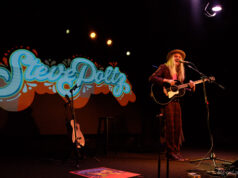When you’re just starting out playing music, Jason Eady said, “you’re told to only play cover songs.” Then, as you meet with some success, people want to hear your own material. After a while, though, he said, you want to play cover songs again.
In his recent solo acoustic performance at Jammin Java — his first time in that venue — Jason took the opportunity to delve into his musical roots, playing a selection of songs that influenced him in addition to his own original tunes.
Though he’s become known as a representative of the Texas tradition of singer-songwriters, Eady was born near Jackson, Mississippi, in 1975 and grew up there. His latest album, released last year, takes its name from his home state. He began his set with the album’s lead-off track, “Way Down in Mississippi.” “Every verse,” he said, “is a different genre of music I grew up on.”
Like many musicians, especially country musicians, Eady’s musical education goes back to church. His family attended what he called “a Pentecostal holly roller church,” where congregants were free to shout, speak in tongues, or whatever the spirit moved them to do. In addition, “the music was amazing;” instead of a choir, the church had a bluegrass band, and sometimes the worship service would give way to the music. One of the songs that was sung in that church was an old Stanley Brothers number, “Take Your Shoes Off, Moses.” Jason’s experiences at that church inspired him to write “God Fearing Blues.”
Like so many artists — and not just country singers — Eady is heavily influenced by Merle Haggard. “Merle Haggard’s my No. 1,” he said, and played two of his songs, “Ramblin’ Fever” and “My Favorite Memory.” He paid tribute during his set to other influences, including Randy Travis (“Digging Up Bones”) and Keith Whitley (“Don’t Close Your Eyes,” finishing up with Guy Clark’s “Dublin Blues.” Introducing that song, he gave a shout-out to Steve Earle, Robert Earl Keen, and Townes Van Zandt (all Texans), who provided him with a model of success that fell between massive popularity and no success at all.
Living in Mississippi, it was natural for Jason to visit New Orleans, “because that’s where the fun is.” “Once Upon A Time In New Orleans,” he said, “is some things I’ve seen there. It’s the clean version.”
It was in Texas where Eady’s career blossomed. After a few releases that helped him developed a regional fanbase, he broke through to the national charts with 2012’s AM Country Heaven, where he fully embraced the classic country sound that has since dominated his records. His set included the title track from that album, which considers the state of music in the present day.
Watch Jason Eady perform “AM Country Heaven” live for Music Fog on YouTube:
When he was making that album, he realized, “If I was going to have an album full of country songs, I had to have at least one drinking song, so he wrote “Wishful Drinking.” Another track from the album, “Old Guitar and Me,” uses a trick he learned from the great songwriters he studied: if you write your age into a song, you get to sing about being that age for the rest of your life.
Playing by himself allowed Jason to take requests, which the audience was happy to supply. “I’ve recorded about 110, 120 songs,and I remember 30 of them.” Fortunately, that includes “Cry Pretty” and “OK Whiskey.” The latter song was influenced by how Oklahoma used to have 3.2% alcohol limit on beer, which it has since repealed, something for which he jokingly took credit.
Eady’s set also included “Saturday Night” and “Old Wanderer,” written with Courtney Patton and Cody Jinks. He wrote “Burn It Down” with Adam Hood, and “Mile Over 45” was composed the same night. “Black Jesus,” he said, “is one of the few songs I recorded I didn’t write,” having been written by Channing Wilson. Before finishing up with the Guy Clark tune, he did a new humorous song about how he’s constantly told he looks like Matt Damon (for the record, I hadn’t seen it until he pointed it out).
Zach Meadows started things off with a 30-minute opening set. Zach moved to Nashville a few years ago, in August of 2022, and he just released his debut album four weeks ago. He also considered moving to Austin, and one of his songs was about “one particular night in the Hill Country.” “Grace of God,” he explained, is “a honky-tonk song. It’s a bit of a departure.”
Watch the official music video for “Grace of God” by Zach Meadows on YouTube:
Though Zach’s music is country, his influences range more broadly to singer-songwriters, as was evident in his cover of Jackson Browne’s “These Days.” He finished with “Marianne,” one his more deeply personal songs, about someone close to him who he lost.
Zach’s songs come from the more literate and narrative side of country music, and the same is true of Jason’s. They’ve both learned from the best, and they’ve gone on to become accomplished songwriters — as well as performers — in their own right.






